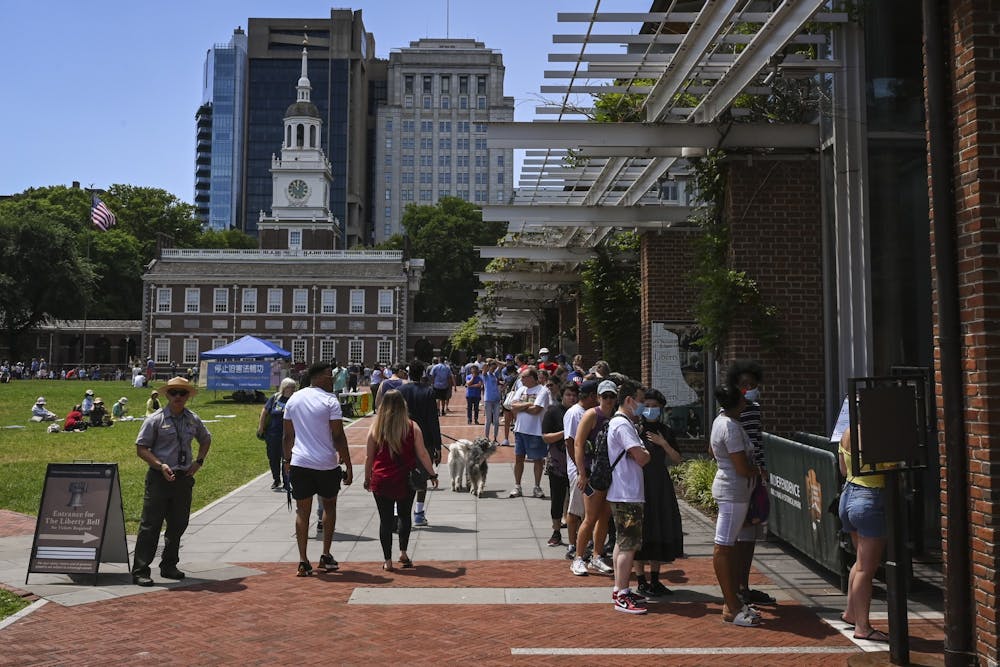Ever since I was little, I have loved the 4th of July. With a summer birthday just one week before (in fact, I was due on July 4th) and a dream of eventually going into politics, this shouldn’t be much of a surprise to anyone. My commitment to Penn brought with it many jokes about our school colors. Some of my fondest memories revolve around the holiday, watching our town's firework display, parties filled with my family decked out in red, white, and blue, and most importantly, the overwhelming sense of patriotism from those around me.
With most of my family, including my father, having been born in Italy and later immigrating to the United States, being American was a luxury. This is not to say I was, by any means, taught an “exceptionalized” version of US history, but it did mean that my parents never let us take for granted the privileges and freedoms that come with being American.
This continued to be the narrative of my young adult life, as most of my friends in high school shared my upbringing. Having come from immigrant families themselves, it was difficult for them to not feel pride of place in America. Furthermore, it was inconceivable not to celebrate everything Independence Day meant for us — specifically, as children of people who weren’t necessarily promised the liberties our stars and stripes represent.
However, last year at the height of a moment of racial reckoning in the United States, there was a strong and present movement which repelled the celebration of the 4th of July. In what was described as a “hypocritical celebration of freedom", people across the country boycotted the 4th of July, claiming solidarity with the Black Lives Matter movement and the lives of people of color lost in the COVID-19 pandemic.
How could people not understand the importance of this holiday and what it means to be American? As someone who had only known critical, yet distinct appreciation for the United States, I was shocked to think that a holiday which always unified Americans was the next divisive point on the “cancelling” chopping block. As this was occurring last year, I explained why I thought celebrating the 4th of July is so critical in a video for my podcast.
A year later, with a different administration, more social justice issues brought to light, and in many ways, an even more divisive political climate, my message is still strong, clear, and more urgent: celebrate the 4th of July and don’t be bashful about your pride of country. However, don’t treat this as just another “long weekend”. Take time to reflect on what being an American means to you, how you take advantage of your freedoms & promote the extension of them for others, and what you would like to do to make your country a better place.
I received a lengthy response to that video, arguing that boycotting the 4th of July was necessary because “not everyone in the U.S. is granted these freedoms”. When we celebrate Independence Day, we don’t do so to revere an American history of bigotry or prejudice, we do so to honor a country where liberty is a value that can be fought for, certainly not a given internationally. Our celebrations this week express our belief that freedom, democracy, and equality are important, and that promoting those maxima is a worthy cause. To be “anti-4th of July'' is to believe that the fight for freedom isn't one to be undertaken or celebrated. You cannot expand rights if you don’t believe in their existence in the first place.
Even Fredrick Douglass, in his now famous 1842 speech “What to the slave is the 4th of July?”, critiques the Independence Day festivities through an undoubtedly patriotic lens: “Allow me to say, notwithstanding the dark picture I have this day presented of the state of the nation, I do not despair of this country…I leave off where I began, with hope.” Whether the 4th of July previously represented a total reverence to American supremacy or not, let this Independence Day mark a reflection for you and those around you on what it means to be American.
MORE FROM THIS AUTHOR:
Lexi Boccuzzi | An in-depth look at the possibility — and difficulty — of Supreme Court Reform
If that wasn’t convincing enough, I oblige you to think about the men and women who risk their lives every day fighting for our ability to deliberate the merits of the 4th of July as a U.S. holiday on our social media pages. Without their sacrifices and everything Independence Day stands for, we would not be able to protest in the first place. For so many people around the world, including all of the immigrants I have personally had the honor of meeting, red, white, and blue represents the hope of representation, civil rights, and a better future. It is vital that we never lose sight of the vibrance of those colors, just because we were born shrouded in them (and as Penn students, go to school in them).
James Baldwin famously said, “I love America more than any other country in the world, and, exactly for this reason, I insist on the right to criticize her perpetually.” Patriotism, in its truest form, is not an infallible view of one's country, but the belief that it can always be made better and that you as its citizen will put in the effort to make that change happen. This Independence Day, honor the patriotism, praising and critical alike, that makes each and every one of us get out of bed in the morning wanting to improve the country we call home.
LEXI BOCCUZZI is a rising College sophomore studying philosophy, politics, and economics from Stamford, Ct. Her email is abb628@sas.upenn.edu.









